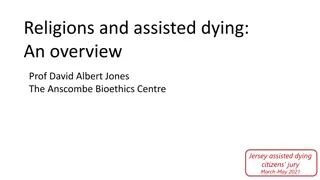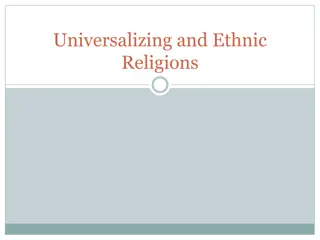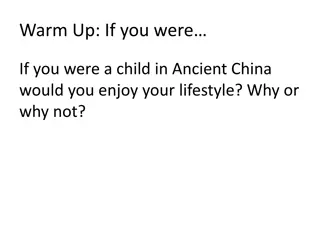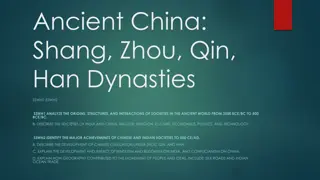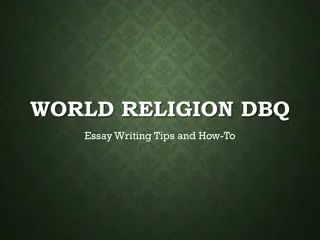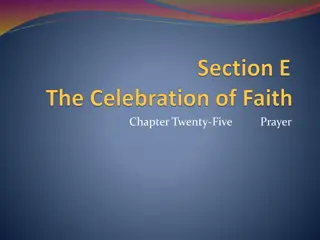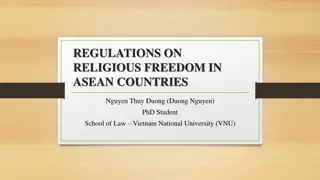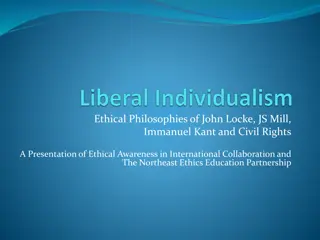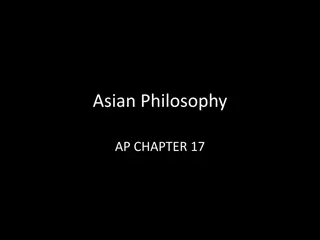Insights into Ancient Religions and Philosophies
Explore the ancient beliefs and teachings of pre-axial religions, Upanishads, and Bhagavad Gita. Discover how these philosophies emphasize individual moral behavior, selflessness, and the quest for wisdom and liberation through meditation.
Download Presentation

Please find below an Image/Link to download the presentation.
The content on the website is provided AS IS for your information and personal use only. It may not be sold, licensed, or shared on other websites without obtaining consent from the author. Download presentation by click this link. If you encounter any issues during the download, it is possible that the publisher has removed the file from their server.
E N D
Presentation Transcript
The aim of pre-axial religion is to promote the stability of the tribe in an uncertain natural environment. Pre-axial religion is world-accepting, concerned with preserving the cosmic and social order. It provides a mythical framework for bestowing meaning on the basic realities of life- survival, reproduction, social cohesion. Ritual sacrifice to influence gods and spirits
Individual moral behavior is necessary to ensure the stability of the clan. An immoral individual can bring pollution and divine retribution to the group. For example, the sin of Achan in Joshua 7. Or, the sin of Adam and Eve that affected all of their descendants. Good behavior brings prosperity to the group, 12 Honor your father and your mother, so that you may live long in the land the LORD your God is giving you. Ex. 20.12
The Upanishads, composed from 800 BCE- 600 CE. There are 200, 14 of which are most important. The teaching is Monistic (or pantheistic)- there is one Reality- Brahman- the impersonal absolute- eternal, infinite, unknowable. Everything else is Maya- illusion. To attain liberation meditation (not sacrifice) is required. The real problem is ignorance, the illusion of individuality, which keeps us bound in Samsara (birth, death, rebirth). The souls of living things are like drops in the great ocean of Brahman, falsely proclaiming their individuality, and selfishly promoting their illusory goals.
You have a right to perform your prescribed duty, but you are not entitled to the fruits of action. Never consider yourself the cause of the results of your activities, and never be attached to not doing your duty. Perform work in this world, Arjuna, as a man established within himself- without selfish attachments, and alike in success and defeat. For yoga is perfect evenness of mind. (2.47f) Non-injury, truth, not stealing, purity, control of the senses- Manu has declared this to summarize dharma for the four castes. (10.63) Bhagavad Gita Code of Manu
They live in wisdom who see themselves in all, and all in them, who have renounced every selfish desire and sense craving tormenting the heart. Neither agitated by grief nor hankering after pleasure, they live free from lust and fear and anger. Established in meditation, they are truly wise. Fettered no more by selfish attachments, they are neither elated by good fortune nor depressed by bad. Such are the seers. (Bhagavad Gita 2: 54-57.)
Yoga and meditation techniques are practiced to gain control over bodily desires and to realize the unity of the individual soul (atman) with the Absolute (Brahman). Indulging in bodily pleasures and immoral conduct generates bad karma and traps the soul in samsara. Ethical conduct is only possible for those who understand the illusory character of the physical world.
He who is free from selfish attachments, who has mastered himself and his passions, attains the supreme perfection of freedom from action. Listen now, Arjuna, and I will describe how one who has attained perfection also attains Brahman, the supreme consummation of wisdom .(18.49f)
First noble truth Dukkha- To live is to suffer Contact with a pleasant person or thing is pleasurable. When such contact becomes impossible, suffering and sadness results. But if you have no attachment to that person or thing, that is freedom/liberation. Whatever is impermanent is dukkha.
The second noble truth Noble truth of the arising of sorrow. It is this thirst (tanha) which produces re-existence and re- becoming, and which is bound up with passionate greed.... Thirst for sense-pleasures, thirst for existence and becoming, thirst for nonexistence. The origin of this thirst is the false idea of self. Selfish craving for and attachment to pleasure, wealth, power, ideas, opinions, and beliefs, generates karma and keeps one bound to samsara.
Third noble truth: there is emancipation, liberation, freedom from suffering. to eliminate dukkha, one must eliminate the thirst that is its source. Nirvana, the extinction of thirst. Freedom from conceit, destruction of thirst, the uprooting of attachment, Nibbana. The extinction of desire, the extinction of hatred, the extinction of illusion. Annihilation of the false idea of self.
Fourth noble truth The way that leads to the stopping of suffering: the eightfold path. Following the 8- fold path leads to the perfection of Ethical conduct, Mental discipline, and Wisdom Right views (intuitive insight: seeing things as they really are, awareness of the triple truth- all existence is suffering and impermanent, there is no permanent self or soul).
Right thought. Selfless renunciation or detachment, thoughts of love and non- violence directed to all living things. Ill-will, hatred, violence, result from lack of wisdom. Right Speech profanity, abusive speech, or idle talk. Right Conduct sexual misconduct, intoxicants. Right Livelihood astrologer, psychic (forbidden jobs). Right Speech- Truthfulness, no slander, Right Conduct- - avoid killing, lying, stealing, Right Livelihood- - butcher, tanner,
Right Effort energetic will to prevent evil thoughts and to produce good thoughts. Right Mindfulness To be attentive to bodily activities, mental states, feelings. Awareness of their nature, arising, and disappearing. Right Effort- - the energetic will to prevent evil thoughts and to produce good thoughts. Right Mindfulness- - To be attentive to bodily activities, mental states, feelings. Awareness of their nature, arising, and disappearing. the Right concentration Discard passionate desires and unwholesome thoughts; suppress intellectual activity, develop tranquility and one- pointedness of mind all sensations disappear, pure equanimity and mindfulness remain.
To abstain from taking life To abstain from taking what is not given To abstain from sensuous misconduct To abstain from false speech To abstain from intoxicants as tending to cloud the mind. To abstain from taking life To abstain from taking what is not given To abstain from sensuous misconduct To abstain from false speech To abstain from intoxicants as tending to cloud the mind.
Fundamental virtue: Jen- humanity, goodness, benevolence. My teaching contains one thread that runs through it all.... What did he mean? Our Master s teaching is simply this: loyalty and reciprocity. (Analects, II.15.) Is there any one word that can serve as a principle for the conduct of life? Confucius said: Perhaps the word reciprocity : Do not do to others what you would not want others to do to you. (Analects, XV.23.)
[The Master] has broadened me with culture, restrained me with ritual (IX.10). The Master said, Courtesy not bounded by the prescriptions of ritual becomes tiresome. Caution not bounded by the prescriptions of ritual becomes timidity, daring becomes turbulence, inflexibility becomes harshness. (VIII.2) He who does not tread in the tracks [of the ancients] cannot expect to find his way into the inner-room (XI.19). He who can himself submit to ritual is good. XII.1 The Master never talked of prodigies, feats of strength, disorders, or spirits. (VII.20.)
If you let people follow their feelings they will be able to do good.... Humanity, righteousness, propriety, and wisdom are not drilled into us from outside. We originally have them with us.... Therefore it is said seek and you will find it....(6A.6) Man s nature is naturally good just as water naturally flows downward....Now you can strike water and cause it to splash upward.... It is the forced circumstance that makes it do so. Man can be made to do evil, for his nature can be treated in the same way. (6A.2)
Human nature is essentially evil- ritual, teaching, and training are required to harness natural passions. Desire for gain------strife. Envy and hate-------injury/cruelty. Passions--------------Excesses, disorder. To give reign to man s original nature and to yield to emotions will assuredly lead to strife and disorderliness, and he will revert to a state of barbarism. Therefore, it is only under the influence of teachers and laws and the guidance of the rules of decorum that courtesy will be observed. From all this it is evident that the nature of man is evil and that his goodness is acquired. (Ch. 23).
Tao- way, path, road: natural, eternal, spontaneous, nameless, indescribable, impersonal, and unkind. Taoist virtues: quietism, pacifity, simplicity, spontaneity, non-action (wu wei) The highest good is like water, Water benefits all things generously and without strife. (8)
It was when the great Tao declined that there appeared humanity and righteousness. It was when knowledge and intelligence arose, that there appeared much hypocrisy. (18) Banish sageliness, discard wisdom, and the people will be benefited a hundredfold. Banish humanity, discard righteousness, and the people will return to filial piety and paternal affection.... Embrace simplicity, reduce selfishness, have few desires. (19)
Wu-wei- non-purposive action, action without intention. The sage manages affairs without action, carries out teaching without speech. Act by no-action, then nothing is not in order. With the nameless uncarved wood there shall be no desire. Without desire there is quietude. The world shall be self ordered.
Judaism: Divine command ethics 1. You shall have no other gods but me. (Ex. 20.3; Deut. 5.7) 2. You shall not make a sculpture or any image. (Ex. 20.4; Deut. 5.8) 3. You shall not take the name of Yahweh in vain. (Ex. 20.7; Deut. 5.11) 4. Remember and keep holy the day of rest. (Ex. 20.8; Deut. 5.12) 5. Honor your father and mother. (Ex. 20.12; Deut. 5.16)
6. Do not kill. (Ex. 20.13; Deut 5.17) 7. Do not commit adultery. (Ex. 20.14; Deut. 5.18) 8. Do not steal. (Ex. 20.15; Deut. 5.19) 9. Do not bear false witness. (Ex. 20.16; Deut. 5.20) 10. Do not covet. (Ex. 20.17;Deut. 5.21)
Archeological evidence indicates that early Israelites worshipped Baal, the goddess Asherah, and another goddess known as Anat-Yahu, in addition to Yahweh. Statues of cherubim were part of the Jerusalem cult in the kingdom periods. The prophets who demanded worship of Yahweh alone in the 8thand 9thcenturies may have inspired the first commandment. The commandments reflect the concerns of a settled community, not a tribe of wandering nomads.
Ex. 21.7 If a man sells his daughter as a female slave, she is not to go free as the male slaves do. Ex. 21.17 He who curses his father or his mother shall surely be put to death. Ex. 21.20; 22:29 Lev. 19.19 You shall not breed together two kinds of your cattle, you shall not sow your field with two kinds of seed nor wear a garment upon you with two kinds of material mixed together.
You may multiply your prayers, I shall not listen . Take your wrong-doing out of my sight. Cease to do evil. Learn to do good, search for justice, help the oppressed, be just to the orphan, plead for the widow. Isaiah 1.15-17. Take away from Me the noise of your songs, For I will not hear the melody of your stringed instruments. 24But let justice run down like water, And good conduct like a mighty stream. (Amos 5)
A sovereign God (who is wise, just, and kind) issues commands. If we follow them, all goes well. If we don t, judgment and retribution may follow. Psalm 61:11 12: Once God has spoken; twice I have heard this: that power belongs to God; and loving kindness is Thine, O Lord, for Thou dost recompense a man according to his work.
Wisdom literature is not based on revelation, it consists, rather, of observations about human behavior that the reader may verify from her own experience. 11.8; 13.24; 15.5 cf.13.1; 23.29- 35;11.22;25.14; 26.11;27.15 Comparisons help one order their experience and find order in the confusion of daily life. 26.27;23.29;24. 30-34;16.25; Act and consequence. Virtue profits 10.2
Little can be known with certainty about the life and teachings of Jesus. The accounts found in the gospels were written 40- 70 years after his death by unknown members of the early Christian community. Contemporary New Testament scholars study both canonical and non-canonical gospels to find the voice print of the historical Jesus, as distinguished from the Christ of faith created by his followers. The historical Jesus The Christ of faith
You wont be able to observe the coming of God s imperial rule. People are not going to be able to say, Look, here it is ! or Over there! On the contrary, God s imperial rule is right there in in your presence. (Luke 17:20-21) [T]he Father s imperial rule is spread out upon the earth, and people don t see it. (Thomas 113.2-4)
Love your enemies, and do good, and lend, expecting nothing in return. Your reward will be great, and you ll be children of the most high. (Q; Luke 6:35) Forgive, and you will be forgiven. (Q; Luke 6.37) Just remember, John the Baptist appeared on the scene, eating no bread and drinking no wine, and you say, he is demented. The son of Adam appeared on the scene both eating and drinking, and you say, There s a glutton and a drunk .:Lk.11.20. Celebrate Love, and forgive
If you have money, don t lend it at interest. Rather, give it someone from whom you won t get it back. (Q: Thomas 95.1-2) Give to everyone who begs from you (Q; Matt. 5.42) When someone slaps you on the right cheek, turn the other as well (Q: Matt. 5.39) If someone sues you for your coat, give him the shirt off your back too. (Q: Matt. 5.40) When anyone conscripts you for one mile, go along two. (Q: Matt. 5.41) Civil disobedience Generosity
If someone sues you for your coat, give him the shirt off your back to go with it. (Matt 5.40) Don t let your left hand in on what your right hand is up to. (Matt. 6.3) It s not what goes into a person that can defile; it s what comes out that defiles. (Mark 7:15) You see the sliver in your friend s eye, but you don t see the timber in your own eye. When you take the timber out of your own eye, then you will see well enough to remove the sliver from your friend s eye. (Thomas 26.1-2)
I will tell you what your Lord has made binding on you: that you shall serve no other gods besides Him; that you shall show kindness to your parents; that you shall not kill your children because you can t support them...; that you shall not commit foul sins, whether openly or in secret; and that you shalt not kill-for that is forbidden by God-except for a just cause. (Sura 6:150)
Do not argue with the followers of earlier revelation otherwise than in the most kindly manner- unless it be such of them as are bent on evildoing- and say: We believe in that which has been revealed to us from on high, as well as that which has been bestowed upon you: for our God and your God is one and the same, and it is unto him that we all surrender ourselves. 29.46 5.49 Vie with each other in good works, for to God you shall all return and he will resolve for you your differences. 2.256 There shall be no compulsion in religion. The ink of scholars is weighed on the Judgment martyrs and the ink of scholars outweighs the blood of martyrs. Hadith The ink of scholars is weighed on the Day of Judgment with the blood of martyrs and the ink of scholars outweighs the blood of martyrs. Day of with the blood of
(1) Confession: There is no god but God and Muhammad is his messenger. (2) Prayer- ritual prayer five times a day. (3) Almsgiving: charity for the needy. (4) Fasting during Ramadan, no food or water, sunrise to sunset. (5) Pilgrimage to Mecca (once, if possible). Submission to the will of Allah
The ethical teachings of the worlds great religious traditions are based on assumptions about the nature of God or Ultimate Reality. What evidence can be provided for the truth of these assumptions? How is it possible for humans to acquire knowledge of the will of God or the nature of Ultimate Reality? How do we respond to the phenomena of religious diversity?






